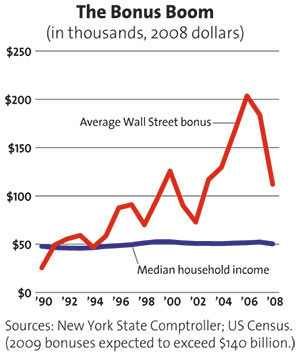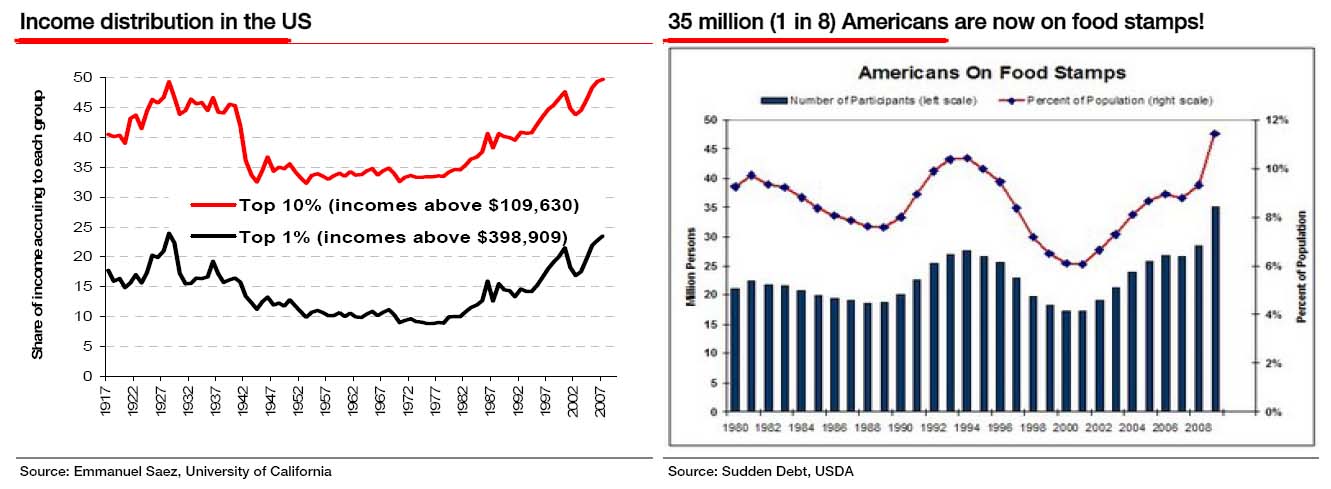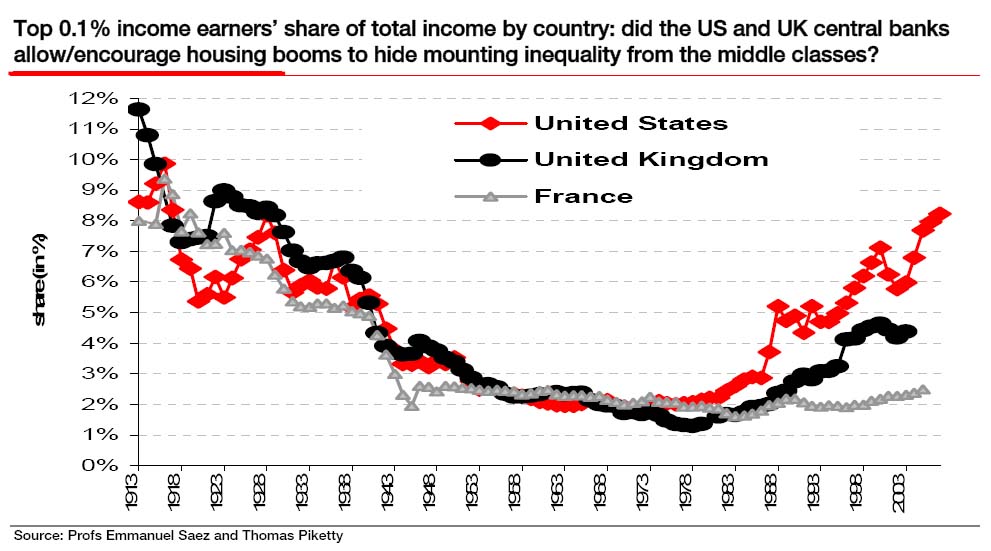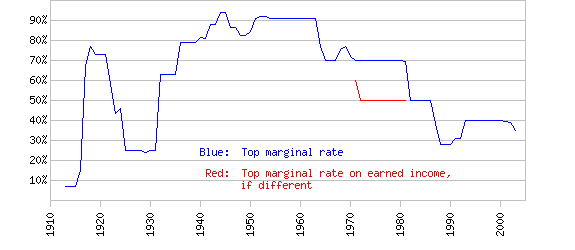
The financial crisis that grips our nation's states and cities has a malicious source, and Governor Tim Pawlenty recently named that source: public school teachers.
"It used to be that public employees were underpaid and over-benefited. Now they are over-benefited and overpaid compared to their private-sector counterparts."
The school teacher, the policeman, the firefighter - these are now the faces of what is wrong with America today. It doesn't matter that studies by the Bureau of Labor Statistics say otherwise, America can no longer afford their overpaid, middle-class salaries.
At least that is what the right-wing media is telling us. Tea party members also want to see a drastic pay cut for the same people who teach their children. A familiar comment on the internet is, "I took a pay cut last year. Why shouldn't they?"
This attitude goes beyond schadenfreude and goes straight to the crabs in a bucket mentality. Strangely enough this attitude of "if I can't have it, neither should you" only extends to working class people who live next door. For some reason none of the jealousy and malice is reserved for the people who actually broke the budgets of the states and cities, i.e. the people who deserve it.
If you really want to know why the cities and states are so broke, then you must first ask yourself where all the money went. Was the firefighter down the street from you buying vacation yachts for his tropical island? Probably not.
However, the guys on Wall Street who sold your school district, county, and state governments complicated financial derivative products are buying yachts for their tropical islands. Maybe we should start there instead.
Detroit Mayor Dave Bing is struggling to save his city from fiscal calamity. Unemployment is at a record 28% and rising, while home prices have plunged 39% since 2007. The 66-year-old Bing, a former NBA all-star with the Detroit Pistons who took office 10 months ago, faces a $300 million budget deficit--and few ways to make up the difference.
Against that bleak backdrop, Wall Street is squeezing one of America's weakest cities for every penny it can. A few years ago, Detroit struck a derivatives deal with UBS (UBS) and other banks that allowed it to save more than $2 million a year in interest on $800 million worth of bonds. But the fine print carried a potentially devastating condition. If the city's credit rating dropped, the banks could opt out of the deal and demand a sizable breakup fee. That's precisely what happened in January: After years of fiscal trouble, Detroit saw its credit rating slashed to junk. Suddenly the sputtering Motor City was on the hook for a $400 million tab.
What most often happened is that Wall Street rating agencies, the same agencies implicated in corrupt business practices, downgraded the municipal bonds, thus turning the the financial deals into an albatross for broke cities, but a profitable one for Wall Street.

Detroit is hardly alone. No state in the union has been spared the backlash of a one-sided financial deal that transferred public wealth to the already wealthy. Wall Street is raking in huge amounts of money from our broke cities and states at the worst possible time. The SEIU did a study which shows the country's municipal governments losing $1.25 Billion just from these interest rate swap deals alone.
"Elected officials are simply no match for the investment banker that's selling the deal."
Yet in conservative political circles there is little blame directed at Wall Street. They would rather blame the guy picking up their garbage for his $45,000 a year wage, than they would denounce the investment banker who tricked their city government out of hundreds of millions of dollars. Can these people even do math?
The logic of this attitude reminds me of someone who drives all the way across town to "save" a couple nickles on gas, while blindly shoving thousands of dollars into their 401k that someone they've never meet on Wall Street manages. Matt Taibbi wrote about this phenomenon last year.
The setup always goes the other way: when the excesses of business interests and their political proteges in Washington leave the regular guy broke and screwed, the response is always for the lower and middle classes to split down the middle and find reasons to get pissed off not at their greedy bosses but at each other. That's why even people like Beck's audience, who I'd wager are mostly lower-income people, can't imagine themselves protesting against the Wall Street barons who in actuality are the ones who fucked them over.
Taibbi describes it as a "peasant mentality". I agree. However, Taibbi doesn't take the logical next step and tells us what it all means - neofeudalism.
In 1958 John Kenneth Galbraith wrote The Affluent Society. It was a book far ahead of its time, and one of the first to use the term "neo-feudalism". It dared to question traditional attitudes towards economics, and for that it was hated and shunned by wealthy conservatives.
Inequality has been justified on many grounds, "principally noted for the absence of the most important reason, which is the simple unwillingness to give up what [the rich] have." Equality has been argued to lead to uniformity and monotony (the rich sponsor the arts and education), redistribution has a musty association with godless communism, and the original Ricardian defense was that the present system was ultimately inevitable, and any attempt to change it would only lead to short-run inefficiency which would make everybody worse off.
This attitude, that some amount of suffering is necessary in the current system, and that any major changes in it would be self-defeating, is what I call Sacrificing to the Volcano God. We have turned economics into a religion, where the mistakes are common, yet the fundamental assumptions it is based on is beyond question. Gaping flaws in logic are ignored, or even held up as unanswerable mysteries that laymen could never understand. When the Volcano God rains ash and lava upon us, it is because we angered the Volcano God with our sins of minimum wage laws, child labor laws, environmental regulations, and worker safety laws. More sacrifices are needed or the Volcano God will destroy us all.
The High Priests of Economics never explain exactly how these sacrifices will fix the economy, nor do they mention that the sins in question might be their own. Yet we still rush to offer up our children's futures through unpayable debts while never considering that there might be better alternatives.
"Jesus Christ is Free Trade, and Free Trade is Jesus Christ."
- Dr. Robert Browning
Like the Volcano God, nothing can stop globalization. There is no alternative.
Besides, globalization is good. They tell us that it creates jobs, and you are expected to believe them even while you watch all the factories in your town close down and get sent overseas.
"Outsourcing is just a new way of doing international trade."
- N. Gregory Mankiw, chairman of Bush's Council of Economic Advisors
This shouldn't surprise anyone. David Ricardo, legendary economist and free-trade proponent, explained how this dynamic worked nearly two centuries ago.
"If instead of growing our own corn... we discover a new market from which we can supply ourselves... at a cheaper price, wages will fall and profits rise. The fall in the price of agricultural produce reduces the wages, not only of the laborer employed in cultivating the soil, but also of all those employed in commerce or manufacture."
- David Ricardo, Des principes de l'economie politique et de l'impot, 1835
So you see, your wages are supposed to fall with free trade globalization. Those who worship the Volcano God knew this all along. They also knew that our manufacturing base was going to move south of the border when NAFTA was passed. They fail to differentiate between free trade and global labor arbitrage.

I never understood how the wealthy elite could think that the impoverishment of the working class could be a good thing until I ran across the story of Plutus the other day.
Plutus, the God of Wealth, was blinded by Zeus so that he would be able to dispense his gifts without prejudice for things like need. When a couple citizens of Athens decide to give Plutus back his sight, the Goddess of Poverty intervenes. She tells them that she is the source of all progress in the world, and that if poverty was eliminated it would destroy civilization.
That's when I realized that the High Priests of Economics aren't actually worshiping a Volcano God. They are worshiping the Goddess of Poverty.
"Thus you dare to maintain that Poverty is not the fount of all blessings!"
- Goddess of Poverty, 388 B.C.
"In a little time [there will be] no middling sort. We shall have a few, and but a very few Lords, and all the rest beggars."
-R.L. Bushman
Neofeudalism is a concept in which government policies are designed to systematically increase the wealth gap between rich and poor while increasing the power of the rich over the poor. It's a party-neutral idea. There is no cabal pushing the plan, merely the sum effect of pressure from the wealthy elite.
Those policies can be seen today. Just look at the fact that earned income are taxed at a higher rate than unearned income, and the repeal of the inheritance tax.
Other ways are harder to measure but no less real, such as white collar criminals receiving slaps on the wrist, while the poor feel the full weight of the law. It's a system with two sets of rules, one for the rich another one for the poor, and that is the definition of neofeudalism.
Another manifestation of neofeudalism is the growing power of corporations, that leave the poor dependent on private interests more powerful than the government, a situation resembling traditional feudal society.
Currently the top 1% of society own 40% of the nation's wealth. The lower 50% of the nation have the mean assets worth less than $28,000. The richest 10% are worth, on average, 143 times that, or $3.976 million.


Note the inverted relationship between marginal tax rates and wealth inequality in the charts above
Despite this disparity, 80% of tea party members think that raising taxes on households making more than $250,000 to pay for universal health insurance is a bad idea. At the same time, 88% of tea party members think Obama, a president they despise, "favors the poor", and 73% think that "providing benefits to the poor encourages them to remain poor".
Noam Chomsky in Hegemony or Survival had this to say:
If working people depend on the stock market for their pensions, health care, and other means of survival, they have a stake in undermining their own interests: opposing wage increases, health and safety regulations, and other measures that might cut into profits that flow to the benefactors on whom they must rely, in a manner reminiscent of feudalism.
Neofeudalism isn't just about the powerful taking over everything. It's about conditioning the poor to accept their designated role in society, even fighting to defend the ability of the wealthy to exploit them. It requires working people to do things that are against their own interests, and nowhere is this more true than in our current economic system.
How is it that we have a politico-economic system in which the government's explicitly stated goal is to entice people to take out loans for houses and cars they don't even need? 150 million cars on the road and we must keep buying new ones? Millions of vacant housing units and we need to build new ones? Homes so full of Chinese junk that half of it goes into off-site storage, and we need to shop more? For whose benefit?
Ever heard of debt-slavery? How about feudalism?
Here's an even better word: peonage.
It always amazed and confused me how everyone in America is obsessed with their credit rating. It's almost as if people don't realize that credit equals debt. Debt is something that people have feared for thousands of years, because unlike Americans today, historically debt was always associated with another scary term - slavery.
Debt bondage, indentured servitude, slavery, they all mean the same thing. Yet somehow the establishment has convinced us that the ability to "manage" our slavery is something to be proud of. They even have a rating system for it.
I'm not being facetious. Being heavily in debt means you don't have the freedom to quit your job. People who have lost their job are unable to move because the enormous debt tied to homes they can no longer afford.
Being tied to a piece of land is the definition of serfdom.
Every once in a while our love for the wealthy elite who are exploiting us wanes. When that happens the American people need to be distracted. Perhaps it is incompetent terrorists in caves in faraway lands. Or maybe its poor immigrants who want low-paying jobs. One way or another there will always be a scapegoat, and we will need to declare war on them. As Taibbi put it:
It's a classic peasant mentality: going into fits of groveling and bowing whenever the master's carriage rides by, then fuming against the Turks in Crimea or the Jews in the Pale or whoever after spending fifteen hard hours in the fields. You know you're a peasant when you worship the very people who are right now, this minute, conning you and taking your shit. Whatever the master does, you're on board. When you get frisky, he sticks a big cross in the middle of your village, and you spend the rest of your life praying to it with big googly eyes. Or he puts out newspapers full of innuendo about this or that faraway group and you immediately salute and rush off to join the hate squad. A good peasant is loyal, simpleminded, and full of misdirected anger.
Welcome to 21st Century America.